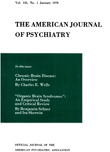Orientational Perception: IV. Time and Length Perception in Depersonalized and Derealized Patients and Controls Under Positive Feedback Conditions
Abstract
Fifteen derealized patients reporting distortions in time and/or space perception and 15 matched controls were tested for differences in their perception of time and space. When the test responses were "fed back" as the input on subsequent trials in order to amplify small but consistent errors, no differences were found. The authors conclude that at this level of illness (depersonalization and derealization), and despite their reports, psychiatric patients do not make a significant number of errors in time and space perception.
Access content
To read the fulltext, please use one of the options below to sign in or purchase access.- Personal login
- Institutional Login
- Sign in via OpenAthens
- Register for access
-
Please login/register if you wish to pair your device and check access availability.
Not a subscriber?
PsychiatryOnline subscription options offer access to the DSM-5 library, books, journals, CME, and patient resources. This all-in-one virtual library provides psychiatrists and mental health professionals with key resources for diagnosis, treatment, research, and professional development.
Need more help? PsychiatryOnline Customer Service may be reached by emailing [email protected] or by calling 800-368-5777 (in the U.S.) or 703-907-7322 (outside the U.S.).



